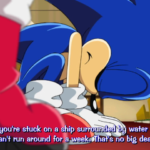I see all the student films flooding my dash so I guess it’s that time of year again, and I know that can mean some emotionally racking things ahead. I know everyone’s path to success is different but I’ll just put this story out there for people in case it offers anyone any solace.
So at Sheridan when you got in (or at least when I did eleven years ago) you were given a number grade attached to your portfolio from 1-100. 60 automatically got you in and 56-59 put you on the waiting list. I was at the very bottom of the waiting list with a 56, and planned to do art fundies for a year to build a better portfolio and reapply. I ended up getting into the program the day before classes started, I was the last person who made it in before they closed the gate that year.
For whatever a numerical ranking of skill attached to artistic ability can be worth, on paper I was ranked as the absolute weakest and unskilled artist in my peer group.
And, to be honest, it fucked with my head a lot. I worked really hard and found my strengths and managed to hammer out my foothold as a contender. I’d like to think at least that the people in my year don’t just remember me as “the weakest and least likely to succeed”, anyway. But when I graduated into the writer’s strike and the economy collapse of 2009 and even basic retail jobs were impossible to find, I’d be lying if I said I didn’t feel like every failure and missed job opportunity was proof that I really was The Worst and had wasted four years of my life, thousands of dollars, and an immeasurable amount of mental anguish trying to convince myself otherwise. I worked as a waitress in a greasy spoon diner with red vinyl seats and a checkerboard floor. I found reasons to love my job, to stay positive (even though I had that anxiety monster strangling me every moment of every day reminding me that I had never been good enough and art school had been a delusional waste of money), I worked hard on improving my portfolio, I kept throwing lines out for jobs, I forced myself to manage my crippling fears of talking to strangers so I could learn to network, I made a conscious effort to learn how to build portfolios that played to my strengths and resist the urge to put down my own work when I was trying to sell myself as a worthwhile employee.
I always had that albatross around my neck, “you were empirically and mathematically proven to be the worst”, but I made the conscious effort to figure out and emphasize my strengths to employers.
In October of 2009 I got a job doing inbetweens on Ugly Americans for Comedy Central. The producer told me that it came down to me and two other guys for the job, but I just had a great attitude. By the time the first season of the show ended, my “great attitude” and stonecold work ethic had gotten me promoted to character design, storyboards, character layout, and keyframe animation. Almost immediately after the first season wrapped up I was hired by a studio in Hollywood, and now I’m a board artist at Cartoon Network.
I won’t say “work hard and you can have everything you ever wanted” because I completely acknowledge that I’ve had a lot of lucky lightning strikes in my life, but I will say don’t let the expectations of failure that people will stack on you choke you out. Speaking as someone who was Literally The Worst at one point in their life, a lot of good things can come from focusing on the positives, resisting the urge to lick your wounds and wallow in failure, and put a concentrated effort into figuring out how what your strengths are and how they make you valuable.
Remember that when it comes to creative endavours “most talented” or “best for the job” is very subjective and doesn’t necessarily equate to a quantifiable number of years worked or 1-100 technical ability score. It can have a lot to do with attitude, work ethic, unique perspective, life experience, so many things that can’t be taught in school or ascribed a numerical value. There’s no single path leading to a single success goalpost. Even if you aren’t following the one you thought you would take you aren’t “a failure”, and your perspective and contribution to creative arts however you decide to make it is uniquely yours. You don’t need to win a Best At Art ribbon before you can be A Success™, and you can find a way to claw out your own little nest in the art world even if you don’t fit the profile of what you always expected a professional artist to be.
Month: April 2016
i really am a “text me if you need something” person. like unless i have something specific to talk about, i don’t usually initiate a conversation. if you wanna talk just to talk then im all here but dont take me not hittin you up as me not caring.
this
I THOUGHT THIS WAS JUST ME?
the sounds
This is an actual event on the planet Earth
Remember how I agonized for days about the lizard that died in my book?
Well my mom found out about it and now she is trying to convince me to not let it die. I’m 30 years old and I feel like I’m gonna be grounded if I don’t change it!
LOL I LOVE THAT IT IS GETTING SUCH A STRONG REACTION THOUGH
Missouri boy sells lemonade to help pay for his adoption | KSL.com
Draft one, all printed. Time to cut out a bunch of stuff!
Hey all! It’s been a long time since I’ve updated here–I’ve been in a cave working away on my second year film! Here it is! It’s about dogs and friendship.
It was a tough story to crack and a long time in the making, but it was worth it and I learned a lot! Hope you enjoy it!
omg this is the cutest thing
I hate when parents don’t explain death to their kids.
(This is all just personal opinion)
“It ran away.”
No. That’s not fair.
It’s dead. It’s not coming back. Don’t do that to a child. Death is really important to understand.YES they might be heartbroken over it but you need explain the truth to them as best you can depending on their age. It will help them understand loss.
I learned about death from an early age watching lions rip apart buffalo on animal planet. That bitch is DEAD. lol.
When my cheap ass fish would die, they where dead. They went up to “fishy heaven”. When one of my cats died, it was dead. It went to “kitty heaven”. My mom used to read me a book about how things that die go to heaven. I was sad but my tiny, imaginative child brain could grasp the concept of my animals going to a “happier” place because they were sick.I just don’t see why or how lying is better other than to protect their little feelings. No one wants to see their child sad but like I said before, I think it’s important to understand loss. Kids get hurt, it happens, it prepares them for adult life.
I’m no parenting expert and I know there are plenty of reasons I wouldn’t understand as to why people think lying would be better. This is all just a pet peeve of mine.
Okay so I’m a mortician-in-training and, right now, I’m taking the required thanatology class which is all about death, dying and bereavement. Our most recent readings were all about children and how to help them make sense of the loss and separation of a loved one. Apparently, most adults seem to think children don’t grieve but they do. Children essentially have seven stages of grief: shock, alarm, disbelief, yearning, searching, disorganization, and resolution. Their grief is harder to understand and assess because they have neither the vocabulary nor life experience to easily express their feelings and needs. A child’s belief structure and how they respond to death is determined by their age/developmental level, the manner of the death, and their relationship with the deceased.
- Birth – 2 yrs: only non-specific distress reactions
- 2-5 yrs: don’t understand the permanence of death; concerned about physical well-being of deceased; not capable of cognitive reciprocity; may want to see and touch deceased’ repeatedly asks same questions about deceased; may act as if death never happened or in a regressive manner; may experience guilt (like, if they once said something like “I wish so-and-so would go away forever, they might think they caused the death)
- 6-9 yrs: more complex understanding; realize death is irreversible and that its universal; find it difficult to believe that death will happen to them (believe it happens only to older people); death can be personified and this allows them to run and hide from it; tendency to engage in “magical thinking” (don’t let them do this, its as bad as you lying to them; keep them grounded in the reality of the death), have strong feelings of loss but have extreme difficulty expressing it; often need permission to grieve
- 9-12 yrs: have cognitive understand to comprehend death is a final event; can understand and accept a mature, realistic explanation of death; short attention spans (they could be sad and grieving one moment and laughing joyfully the next, and someone could see that and negatively comment on it. Like, “how can so-and-so be acting like that?” This can intensify their already fluctuating emotions and present feelings of guilt and low self-worth); their vocabulary is advanced enough to express their feelings but they may not want to talk about what’s bothering them (they’ll let it build up and manifest in behavioral problems); interest in the physical aspect of death and what happens after; may imitate decreased’s mannerisms
- 13-18 yrs: understand the meaning of death; realize its irreversible and happens to everyone; normal puberty will intensify grief by adding to already conflicting emotions; often put in position of being the protector, comforter, caregiver (feel they must comfort others t their wen emotions are suppressed; they’ll look find on the outside but be falling apart inside); experience conflicting feelings about death (try to overcome fears by confirming control of their mortality; risk taking behavior); males are more likely to express grief in aggressive behaviors while females need comfort, to be held and reassured
There’s basically 10 rules:
- Tell them ASAP: its important to start with what they know about death and then expand on that; be gentle and trustful; tell them in a comfortable, safe and familiar place and make sure its in language they’ll understand; never assume they understand the way you do
- Be truthful: kids can sense dishonesty ok?! So don’t create lies to protect them; don’t make up stories that’ll have to be changed later on cause that only confuses them and promotes emotional instability; don’t withhold information either (within reason, see #3), place emphasis on the facts, and avoid euphemisms (i.e., “passed away”, “departed”, “went away”, “got sick” (they’ll associate illness and death go hand-in-hand and may think a common cold will kill them), etc)
- Share only details they’re ready to hear: truthfulness should be balanced with their readiness for details (like, tell them someone died in a horrible auto accident but maybe not say they were decapitated and their head flew off down the highway in the process); children with actualize a crisis like an adult; its not uncommon for them to ask about a death later in life and that provides the opportunity to deliver info that wasn’t previously shared (i.e., the decapitation)
- Encourage expression of feelings: a child will experience stages of grief very similar to those of adults (adults typically follow the Kubler-Ross 5 stages while kids have 7, seen above) and they rely on adults for permission to “feel” loss; best way is for them to learn is to hear and watch adults because they get their understanding of grief through their senses; its not unusual for them to go up to people and just make a statement like “My dad died” cause they want to see how that person will react and give them a clue as to how they should react, so its important for adults to “feel” their grief in the presence of the child; explain why you’re sad and reassure them that its okay for them to feel sad and cry and that its okay if they aren’t
- Take child to the funeral: seeing is believing; they should be given the option to view the body but don’t force them; a funeral can be a positive experience but their level of involvement in the funeral process should be their individual decision; give them the choice as to the extent of their involvement
- Take child to the cemetery: it can be comforting to them to know where the body is buried and how it got there; it can also help them direct their grief at an appropriate object (this lessens emotional disorganization), and it lessens the child’s chances of denying or avoiding the death
- Let them tell others about death: adults “talking over” kids creates anxiety; when the child can explain it to another person, in their own words, they feel more in control and have a greater understanding; let them speak!
- Encourage talk of the loss: this allows feelings to be expressed and incorrect ideas about any aspect of the loss to be corrected
- Be available to answer questions: you need to answer each question as sincerely and accurately as possible; understand that some can’t be answered but simply being available is important; and be patient cause they will ask the same question repeatedly
- Never tell them how they should or shouldn’t feel: you don’t like it when people do it to you, so don’t do it to kids; they should be encouraged to express any feeling and they should feel accepted for it; being told “not to feel” a certain way leads to emotionally “playing dead” and that’ll create repression, which creates interpersonal conflicts in later life due to inability to communicate emotions
This was a super interesting read.
“Their grief is harder to understand and assess because they have
neither the vocabulary nor life experience to easily express their
feelings and needs.”
The amount of lesbians who know that they’re lesbians from a young age versus the amount of gay men who know that they’re gay from a young age shows a staggering difference in that most lesbians take way longer to realize that they’re gay.
Girls are told that dating men is supposed to be hard and essentially unfulfilling. That it’s normal to expend emotional and sexual labor without receiving anything or feeling anything in return. Girls are told that their attraction to men and relationships with men should be difficult and sometimes feel forced because men are so emotionally lacking or otherwise “hypermasculine”.
Realizing that you don’t like men because you’re gay versus just feeling emotionally exhausted or unable/unsure of how to “please” men is part of the reason why compulsory heterosexuality is so damaging. It forces many girls to continue to date men and to keep trying to feel attraction to them long after they’ve realized that there’s nothing there—particularly blaming themselves for the reasons why relationships with men don’t work out instead of thinking it’s an indicator of being gay, which most (though of course not all) gay men are able to recognize as an initial indicator.
Shit







